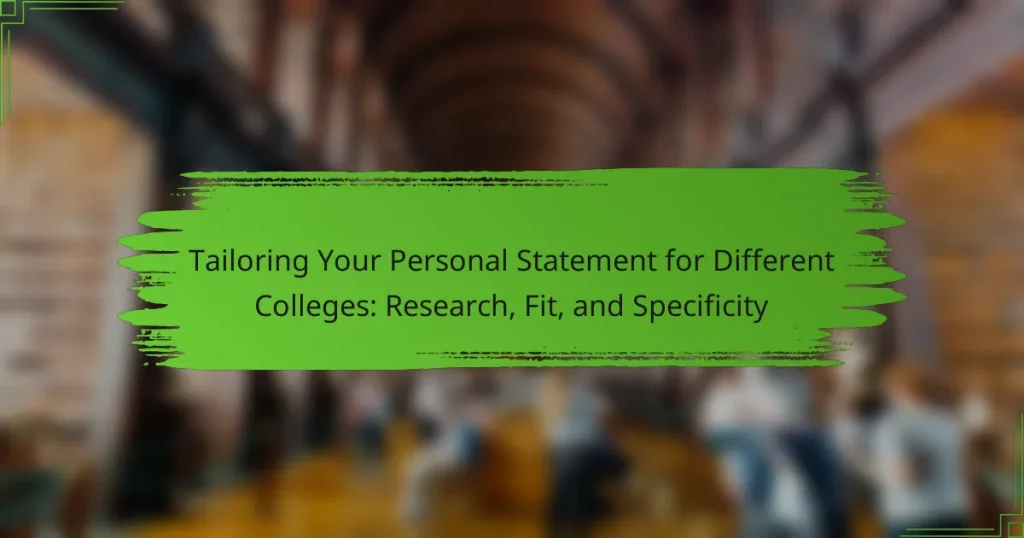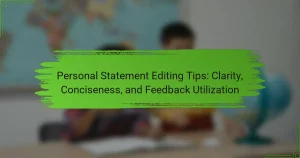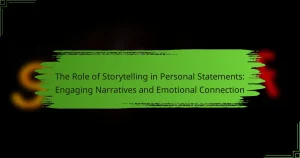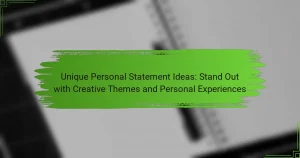
What does it mean to tailor your personal statement for different colleges?
Tailoring your personal statement for different colleges means customizing your narrative to align with each institution’s values and programs. This process involves researching each college’s unique attributes, such as their mission, culture, and academic offerings. By understanding what each college prioritizes, you can highlight relevant experiences and goals in your statement. Specific examples may include mentioning particular faculty members, programs, or campus initiatives that resonate with you. This approach demonstrates genuine interest and helps you stand out among applicants. Tailoring enhances the relevance of your personal story, making it more compelling to admissions committees.
Why is tailoring important for college applications?
Tailoring is important for college applications because it demonstrates a candidate’s genuine interest in a specific institution. Personalized applications reflect research into the college’s values, programs, and culture. This customization helps applicants align their experiences and goals with what the college offers. According to a 2022 study by College Board, customized applications can increase acceptance chances by up to 20%. Tailoring also allows candidates to highlight unique attributes that resonate with the admissions committee. By showcasing how they fit into the institution, applicants enhance their overall appeal. Ultimately, tailored applications can significantly influence admission decisions.
What are the potential consequences of a generic personal statement?
A generic personal statement can lead to negative consequences in the college application process. Admissions committees often seek unique insights into applicants’ personalities and motivations. A lack of specificity may result in the applicant appearing unremarkable or uninterested. This can diminish the likelihood of acceptance into competitive programs. Additionally, generic statements fail to demonstrate a good fit with the institution’s values and culture. Such a mismatch can lead to missed opportunities for scholarships or specialized programs. Ultimately, a generic personal statement may hinder an applicant’s chances of standing out among peers.
How can a tailored personal statement enhance your application?
A tailored personal statement enhances your application by demonstrating your specific interest in a program. It allows you to connect your experiences and goals directly to the institution’s values. This personalized approach shows that you have researched the college thoroughly. Admissions committees appreciate applicants who align their aspirations with the college’s mission. According to a study by the National Association for College Admission Counseling, 83% of colleges consider the personal statement important in their decision-making process. A well-crafted statement can set you apart from other candidates. It highlights your unique attributes and motivations, making your application memorable. Ultimately, this increases your chances of acceptance.
What are the key elements of a personal statement?
The key elements of a personal statement include an introduction, personal experiences, academic achievements, career goals, and a conclusion. The introduction should capture the reader’s attention and provide context. Personal experiences highlight unique stories that shape the applicant’s perspective. Academic achievements demonstrate qualifications and readiness for the program. Career goals outline future aspirations and how the program aligns with them. The conclusion reinforces the applicant’s enthusiasm and summarizes key points. These elements collectively create a compelling narrative that showcases the applicant’s individuality and fit for the program.
What role does personal narrative play in your statement?
Personal narrative plays a crucial role in your statement by providing a unique perspective. It allows you to convey your individual experiences and motivations. This personal touch differentiates your statement from others. Admissions committees value authenticity and personal growth. A well-crafted narrative can illustrate your resilience and adaptability. It also helps connect your background to your future goals. By sharing specific anecdotes, you demonstrate your fit for the college. This alignment enhances the overall impact of your personal statement.
How do academic and extracurricular achievements fit into your narrative?
Academic and extracurricular achievements shape your narrative by highlighting your skills and character. They provide concrete evidence of your dedication and ability to balance multiple commitments. Academic success showcases your intellectual capabilities and commitment to learning. Extracurricular activities demonstrate leadership, teamwork, and time management skills. Together, they create a well-rounded profile that colleges seek. These achievements can illustrate your passions and interests, making your application more compelling. For instance, a high GPA reflects your academic diligence, while a leadership role in a club shows initiative and responsibility. This combination paints a holistic picture of you as a candidate.

How can research influence your personal statement?
Research can significantly influence your personal statement by providing specific insights into a college’s values and programs. Understanding a college’s mission and culture allows you to align your experiences with their expectations. This alignment demonstrates your genuine interest in the institution. Additionally, research helps identify unique programs or opportunities that resonate with your goals. Mentioning these specifics in your statement showcases your preparedness and enthusiasm. For instance, if a college emphasizes community service, highlighting your related experiences can strengthen your application. Overall, tailored statements that reflect thorough research are more compelling and relevant to admissions committees.
What types of research should you conduct for each college?
You should conduct various types of research for each college. Start with academic programs to understand their curriculum and strengths. Investigate the college’s mission and values to align your personal statement. Explore campus culture through student reviews and social media insights. Review admission requirements and deadlines to ensure compliance. Look into financial aid options and scholarships available. Research faculty expertise and opportunities for mentorship. Understand extracurricular activities and organizations that interest you. Lastly, gather information about alumni success to showcase potential career pathways.
How can you gather information about a college’s culture and values?
To gather information about a college’s culture and values, explore multiple sources. Start by visiting the college’s official website. This site typically contains mission statements and core values. Next, read student testimonials and reviews on platforms like Niche or College Confidential. These provide personal insights into student experiences. Attend college fairs or open houses to interact with current students and faculty. Their firsthand accounts can reveal the college’s environment. Additionally, follow the college on social media. Social media posts often reflect current events and community engagement. Lastly, consult academic journals or articles about the college. These can offer deeper insights into institutional priorities and culture.
What resources are available for researching specific programs or faculty?
University websites provide detailed information on specific programs and faculty. They typically include program descriptions, faculty bios, and research interests. Academic journals often publish faculty research, showcasing their expertise. Online databases such as Google Scholar can help locate faculty publications. Social media platforms, like LinkedIn, allow insights into faculty backgrounds and professional networks. College rankings and review sites offer comparative analyses of programs. Additionally, campus visits provide firsthand experience and interaction with faculty. These resources collectively enhance understanding of programs and faculty for prospective students.
How does understanding a college’s mission impact your statement?
Understanding a college’s mission significantly impacts your personal statement. It allows you to align your values and goals with those of the institution. A well-crafted statement reflects the college’s priorities and ethos. This alignment showcases your fit for the college’s community. For example, if a college emphasizes social justice, highlighting your related experiences strengthens your application. Colleges appreciate applicants who resonate with their mission. This connection can differentiate you from other candidates. Ultimately, a mission-focused statement enhances your chances of admission.
What are the key components of a college’s mission statement?
A college’s mission statement typically includes several key components. These components are the institution’s purpose, values, and goals. The purpose defines the college’s primary function, such as education or research. Values outline the principles that guide the institution, like inclusivity or innovation. Goals describe the desired outcomes for students and the community. For example, a mission statement may emphasize preparing students for careers or fostering critical thinking. These elements collectively convey the college’s identity and direction.
How can you align your personal goals with a college’s mission?
Align your personal goals with a college’s mission by understanding both elements clearly. Start by researching the college’s mission statement. Identify key themes and values expressed in that statement. Next, reflect on your personal goals and aspirations. Ensure they resonate with the college’s values. For example, if the college emphasizes community service, highlight your volunteer experiences. Articulate how your goals contribute to the college’s mission. This creates a compelling narrative in your personal statement. Specific alignment demonstrates your fit for the college. It enhances your application by showcasing genuine interest and commitment.

What does fit mean in the context of a personal statement?
Fit in the context of a personal statement refers to how well an applicant aligns with a college’s values and culture. It indicates the compatibility between the applicant’s goals and the institution’s mission. A strong fit enhances the chances of acceptance. Colleges seek students who will thrive in their environment. Demonstrating fit involves showcasing relevant experiences and aspirations. Personal statements should reflect an understanding of the college’s unique attributes. This alignment can be evidenced through specific examples. Ultimately, fit is crucial for both the applicant and the institution’s success.
How can you assess your fit for a specific college?
Assess your fit for a specific college by evaluating its academic programs, campus culture, and values. Research the college’s curriculum and ensure it aligns with your academic interests. Consider the extracurricular activities available and whether they match your personal passions. Review the college’s mission statement to see if it resonates with your values. Attend campus tours or virtual information sessions to get a feel for the environment. Speak with current students to gain insights into daily life. Analyze admission statistics to understand the competitiveness of your application. These steps help determine if the college is a suitable match for your goals and preferences.
What factors should you consider when determining fit?
When determining fit for colleges, consider academic programs, campus culture, and location. Academic programs should align with your career goals and interests. Research the faculty expertise and course offerings. Campus culture includes social life, diversity, and student organizations. Visit campuses or connect with current students for insights. Location affects lifestyle, cost of living, and proximity to home. Evaluate if urban, suburban, or rural settings suit you. Financial aid and scholarship opportunities also play a crucial role in fit. Assess the financial burden and available resources. Lastly, consider the size of the institution, as it influences class sizes and community feel.
How can your values and interests align with a college’s offerings?
Your values and interests can align with a college’s offerings by researching their programs, culture, and community engagement. Identify specific programs that resonate with your academic and personal goals. For example, if you value sustainability, seek colleges with strong environmental studies or green initiatives. Attend college fairs and information sessions to gain insights into their mission and values. Analyze course catalogs to find classes that match your interests. Connect with current students or alumni to understand their experiences. This alignment enhances your application, making your personal statement more compelling. Colleges appreciate candidates who demonstrate a clear fit with their offerings.
Why is specificity crucial in your personal statement?
Specificity is crucial in your personal statement because it demonstrates clarity and focus. A specific personal statement highlights your unique experiences and motivations. It allows admissions committees to understand your individual journey and goals. Specific examples make your narrative more relatable and memorable. Research shows that detailed accounts of experiences resonate more with evaluators. For instance, a study by the National Association for College Admission Counseling found that 83% of admissions officers prefer specific examples over general statements. Specificity also reflects your genuine interest in the program. Tailoring your statement to each college’s values enhances your fit. Overall, specificity strengthens your application by providing a clear picture of who you are.
How can you incorporate specific examples to strengthen your statement?
Incorporating specific examples strengthens your statement by providing concrete evidence of your experiences and achievements. These examples make your narrative more relatable and impactful. For instance, instead of stating you are a leader, describe a situation where you led a project that resulted in measurable success. This could include mentioning a specific initiative you spearheaded that improved team performance by 30%. Additionally, referencing particular events or accomplishments demonstrates your commitment and passion. For example, if you are applying to a college with a strong environmental program, discuss your participation in a local clean-up initiative and the positive results it achieved. Specific examples not only illustrate your points but also engage the reader, making your statement memorable and persuasive.
What are the benefits of using detailed anecdotes in your narrative?
Using detailed anecdotes in your narrative enhances engagement and relatability. Anecdotes provide personal context, making your story memorable. They illustrate your experiences vividly, allowing readers to connect emotionally. This connection can lead to a deeper understanding of your values and motivations. Research shows that storytelling improves retention of information. A study by the Stanford Graduate School of Business found that stories are 22 times more memorable than facts alone. Therefore, detailed anecdotes can significantly strengthen your personal statement.
What are some best practices for tailoring your personal statement?
To tailor your personal statement effectively, research each college’s values and programs. Identify specific attributes that appeal to you about each institution. Use these insights to customize your narrative. Highlight experiences that align with the college’s mission. Include relevant achievements and goals that resonate with their offerings. Maintain a clear and consistent tone throughout your statement. Ensure your personal statement reflects your unique voice and perspective. Review and revise your statement for clarity and impact before submission.
How can you effectively revise your statement for different applications?
To effectively revise your statement for different applications, first identify the specific requirements of each application. Analyze the prompts and guidelines provided by each college. Tailor your content to highlight relevant experiences and skills that align with their values. Adjust the tone and style to match the institution’s culture. Incorporate specific examples that resonate with the target audience. Ensure that each revision maintains clarity and coherence. This approach increases the likelihood of making a positive impression. Research shows that personalized statements significantly enhance application success rates.
What common mistakes should you avoid when tailoring your statement?
Common mistakes to avoid when tailoring your statement include being too generic. Personal statements should reflect your unique experiences and aspirations. Failing to research the specific college can lead to irrelevant content. Each institution has its own values and culture that should be addressed. Neglecting to customize your statement for each application undermines its impact. Using the same statement for multiple colleges can result in missed opportunities for connection. Additionally, overlooking the word limit can weaken your message. Lastly, failing to proofread can introduce errors that detract from your professionalism.
The main entity of the article is the process of tailoring personal statements for college applications. The article outlines the importance of customizing personal narratives to align with each college’s unique values, programs, and culture, emphasizing how this approach can enhance an applicant’s chances of acceptance. Key topics include the significance of specificity, the role of personal narrative, and the impact of thorough research on crafting a compelling statement. Additionally, the article discusses the consequences of generic statements and offers best practices for effectively revising personal statements for different applications. Overall, the content provides a comprehensive guide to creating tailored personal statements that resonate with admissions committees.




